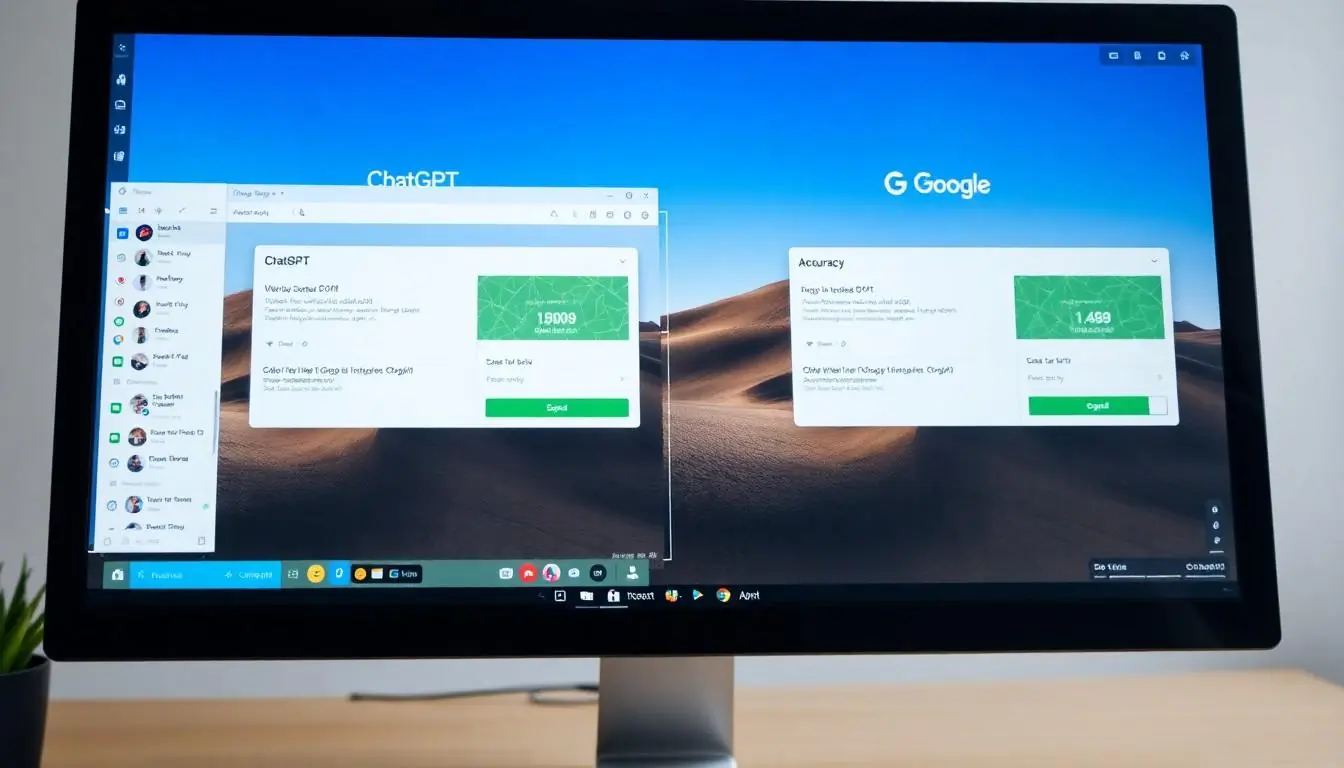Table of Contents
ToggleIn the battle of the bots, two titans square off: ChatGPT and Google. On one side, we have ChatGPT, a conversational whiz that can spin tales and answer questions like your favorite trivia buddy. On the other, Google, the search engine giant that’s been serving up answers faster than you can say “I need coffee.” But which one really knows its stuff?
Overview of ChatGPT and Google
ChatGPT and Google serve distinct functions in the realm of artificial intelligence and information retrieval. Understanding these technologies helps clarify their unique advantages.
Understanding ChatGPT
ChatGPT operates as a conversational AI model designed to engage users through dialogue. It excels in generating human-like responses, making it ideal for interactive applications. This model uses a transformer architecture to understand context and provide relevant information. In educational scenarios, ChatGPT helps users explore topics with depth, offering explanations that flow like a conversation. Additionally, it adapts to different user styles, enhancing the overall experience.
Understanding Google Search
Google Search excels as a powerful tool for information retrieval on the internet. This search engine utilizes advanced algorithms to index vast amounts of data, delivering relevant results almost instantly. Users benefit from features like autocomplete suggestions and featured snippets, which facilitate quick access to information. With machine learning, Google continuously improves its search results, tailoring them to user behavior and preferences. It focuses on providing credible sources, ensuring users find accurate information efficiently.
Accuracy Metrics

Accuracy in AI tools like ChatGPT and Google manifests in multiple dimensions. Understanding how each system measures and represents information provides insights into their reliability.
Defining Accuracy
Accuracy refers to the correctness of information provided by AI systems. It encompasses factual precision and relevance to user queries. ChatGPT excels in generating contextually appropriate responses, often delivering information based on conversational cues. Meanwhile, Google prioritizes factual data accuracy, retrieving verified content from reputable sources. Both systems aim for high accuracy, yet they approach it differently.
Factors Influencing Accuracy
Several factors influence the accuracy of ChatGPT and Google. Data quality significantly affects outcomes; high-quality datasets lead to more accurate responses. User input dynamics also play a role; clear, specific queries fetch better results. Additionally, algorithmic updates and learning mechanisms shape Google’s search results over time. For ChatGPT, improvements in training datasets enhance conversational depth and accuracy. Contextual understanding is vital as well; it enables both systems to provide relevant, timely information.
Comparing ChatGPT and Google
Both ChatGPT and Google offer unique approaches to accuracy in their respective fields. ChatGPT excels in contextual understanding, while Google stands out for real-time information access.
Contextual Understanding
Contextual understanding remains a strong suit for ChatGPT. This AI model comprehends and generates responses based on conversational nuances. It tailors interactions, making discussions feel fluid and organic. In educational settings, a user asks questions and receives detailed, relevant answers that reflect their inquiries accurately. Its capability to adapt to different conversation styles adds depth, catering to diverse learning preferences. This responsiveness ensures richer dialogues.
Real-Time Information Access
Real-time information access represents a key feature of Google. As a search engine, it retrieves data from an extensive database, providing users with the most current information available. Algorithms index content rapidly, delivering results in seconds. A query about recent events yields links to trustworthy news articles, while suggestions refine search accuracy. Continuous algorithm updates enhance this efficiency, ensuring users receive relevant outcomes consistently. Instantaneous retrieval emphasizes Google’s strength in providing factual data on demand.
User Experience
User experience significantly impacts the effectiveness of ChatGPT and Google. Both platforms offer unique interactions that cater to different needs.
Interaction with ChatGPT
Interaction using ChatGPT feels conversational. Users engage with an AI capable of understanding nuanced queries. This system generates personalized responses based on prior messages. It fosters a sense of dialogue, allowing users to delve deeper into topics. Questions about complex subjects often yield informative, context-rich replies. Users can explore various angles, enhancing learning and retention. This adaptability makes ChatGPT suitable for educational purposes. Feedback influences future interactions, creating a customized experience.
Interaction with Google
Users find interactions with Google fast and efficient. It delivers answers quickly, often presenting information directly on the results page. Search results include links to reputable sources, promoting reliable information retrieval. Advanced algorithms suggest related searches, improving user navigation. Instant access to a wealth of data satisfies diverse user needs. New features enhance search experience, such as featured snippets. Interactions remain straightforward and focused on retrieving factual information. Google’s updates refine results, ensuring relevance to user queries.
Case Studies
The effectiveness of ChatGPT and Google can be illustrated through various use cases.
Use Cases for ChatGPT
ChatGPT excels in educational environments where users seek in-depth discussions. It supports students in learning complex subjects by providing detailed explanations. Engaging users in debates or discussions allows it to demonstrate its conversational abilities. The model’s flexibility makes it ideal for crafting narratives and generating creative content. Utilizing ChatGPT for brainstorming sessions fosters innovative ideas while ensuring tailored responses. Additionally, it aids in language learning by simulating conversational practice. Overall, its strengths in generating contextually rich dialogues provide a valuable resource for users.
Use Cases for Google
Google thrives in scenarios needing quick information retrieval. Users rely on its algorithms to gain timely access to current data, particularly for recent events. Searching for product details or local services enables efficient decision-making. Google Maps integration also enhances navigation and location-based queries. It serves academics by offering a comprehensive range of scholarly articles through Google Scholar. Users can effortlessly compare information from multiple sources, promoting well-rounded perspectives. In emergency situations, instant access to relevant, verified data can prove invaluable. These capabilities underline Google’s role as a powerful tool for immediate information gathering.
Choosing between ChatGPT and Google ultimately depends on the user’s needs. For in-depth conversations and personalized learning experiences, ChatGPT shines with its ability to engage users in meaningful dialogue. Its contextual understanding makes it a valuable tool for educational purposes and creative brainstorming.
On the other hand, Google excels in providing quick access to verified information. Its efficiency in retrieving real-time data ensures users get accurate answers promptly. Each platform has distinct strengths that cater to different scenarios, making them both invaluable in their own right. Users can benefit from leveraging both technologies, depending on their specific requirements for accuracy and engagement.









